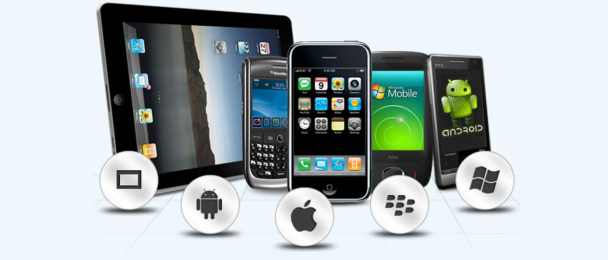The development of mobile application is an extremely exciting and challenging process. This process requires many considerations, because you will to decide on the type of app you want to create, and then choose the right platform and technology for your application. Even if you have no difficulties making these decisions, you still cannot be sure that your app will become popular among the users. Content prepared by Nearshore development company Freeze Pro Software.
Of course, when building a new mobile app, every startup hopes it will be successful, get top positions in Apple and Google Play stores and provide decent revenue. However, before these dreams come true, it is necessary to spend some time and effort into developing an outstanding app, tailored to the demands of modern users.
Mobile App Platform Market Share
The first decision you need to make is to choose the platform for your future app. Generally, developers choose between Android and iOS, as these are the most popular platforms at present.
The latest research shows that Google’s Android has the largest market share at 52.14%, Apple’s iOS holds 40.82% market share. Other mobile platforms are a lot less popular than the market leaders and hold the following market shares: Windows Phone – 2.6%, Java Me – 1.72%, Symbian – 1.38, BlackBerry – 1.23%, Kindle – 0.04% and other platforms have 0.06% market share.
So, let’s focus on the most important aspects you need to consider when choosing the best platform and technology for your mobile application.
Choosing the Right Mobile Platform
It goes without saying that mobile application platforms are not alike. So when deciding on the best platform for your app, you need to consider the following criteria:
Multi-Channel and Multi-Platform Capability
A good app development platform allows creating interface structures compliant with multiple mobile devices, like laptops, phones and tablets. It also allows the integration with various legacy systems and back office environments. In other words, you need to choose a platform that allows for developing an application once and then deploy it to mobile devices and desktops.
Quick and Agile Development
Quick development of mobile apps that are easy to test and improve is undoubtedly beneficial. The easier and faster the development process is, the more economically-efficient the project will be.
Security
Modern mobile development platforms provide a rich set of features that enable developers to build applications with a high level of security.
Governance and Audibility
Mobile development platforms should offer automatic encoding of governance and audibility for the app, and this process should go beyond the UI.
Native or Cross-Platform Development
Another, no less important decision you need to make, is to think over the pros and cons of native and cross-platform development, and choose the one that suits your needs the most.
Cross-platform development seems to be very lucrative, as it allows building one app that can be used on various devices and platforms. In other words, development of cross-platform hybrid mobile applications allows for saving time and money, as there is no need for building several similar applications for different devices and platforms.
On the other hand, functionality of cross-platform apps is significantly lower than that of native apps. Also, hybrid apps are usually more difficult to maintain.
Native applications are created for a specific device or platform. Such apps are fast, reliable and have a high productivity. Native apps are very user friendly and have a native user interface. However, if you want to support several platforms, you need to create a separate application for each targeted platform.
Xamarin Vs PhoneGap
If you make a decision to create a hybrid app, you need to choose a reliable cross-platform development tool. Developers can choose from a variety of such tools; however, the most popular are Xamarin and PhoneGap.
Both frameworks offer a rich set of powerful features and provide the ability to develop top-quality apps. They make it possible to develop native apps and UIs for multiple platforms. However, when it comes to the development of larger and more complex projects, a vast majority of IT specialists give preference to Xamarin developers. It supports MVC and MVVM development patterns and offers more features essential for the development of larger projects.
When choosing a mobile platform for your project you also need to focus on the following aspects:
Good Performance
Moderns users are very demanding. They require apps that can be easily customized to their particular needs. To save money on app development many companies opt for cross-platform development. If you make a decision to build a hybrid app, you need to remember that its performance won’t be the same on different mobile application platforms. So when choosing a platform make sure it guarantees good performance and has the following features:
- Secure storage on mobile devices.
- Multiple testing functions.
- Ability to identify networks.
- Storing and organizing backup data obtained from different sources (e.g. physical or virtual notes).
- Currently running processes.
- Source code optimised for mobile apps/usage.
- Optimized and efficient protocols to exchange data.
High Efficiency and Collaboration Level
Quite often apps, and especially those created for enterprises, are developed by a group of developers, who may live in different countries, use diverse frameworks, programming languages and third-party libraries. This is why it is very important to have a centralized overview of the entire project development. To make app development easier and more efficient, it is crucial to use the right tool that features:
- Easy integration with third party frameworks.
- Secure and reliable control management.
- Comprehensive error-reporting and testing functions.
- Efficient tools for collaboration.
- Possibility to develop independent elements.
Simple Management of Mobile Devices, Applications and Data
With the modern hectic way of life, users need to have quick access to transactions and data even on the go. This access should not just be easy but also secure. In other words, a mobile platform should offer some reliable control and management features, as well as features that prevent the loss of data.
Infrastructure Integration Third-Party Services Support
When choosing a mobile platform, evaluate the ways it will be integrated with your existing IT infrastructure. This concerns both business and development. Business processes need to run flawlessly, while the application infrastructure should handle the complexity of data flow from the application front-end to back-end, databases and other resources that are part of your infrastructure.
Investment Protection
The mobile market is not like other markets out there, that have established leaders and fairly predictable trends. When investing in a mobile app, make sure the chosen vendor can quickly adapt to new environments, use cases, form factors and even platforms, which is dictated by the user demand and global market movements. You never settle a mobile market.
Choosing the right platform for your mobile app is half the battle. Making this choice may be rather difficult, so take time to ponder over all pros and cons of a platform you consider using.

